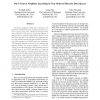Free Online Productivity Tools
i2Speak
i2Symbol
i2OCR
iTex2Img
iWeb2Print
iWeb2Shot
i2Type
iPdf2Split
iPdf2Merge
i2Bopomofo
i2Arabic
i2Style
i2Image
i2PDF
iLatex2Rtf
Sci2ools
206
Voted
ICDE
2007
IEEE
2007
IEEE
On k-Nearest Neighbor Searching in Non-Ordered Discrete Data Spaces
A k-nearest neighbor (k-NN) query retrieves k objects from a database that are considered to be the closest to a given query point. Numerous techniques have been proposed in the past for supporting efficient kNN searches in continuous data spaces. No such work has been reported in the literature for k-NN searches in a non-ordered discrete data space (NDDS). Performing k-NN searches in an NDDS raises new challenges. The Hamming distance is usually used to measure the distance between two vectors (objects) in an NDDS. Due to the coarse granularity of the Hamming distance, a k-NN query in an NDDS may lead to a large set of candidate solutions, creating a high degree of nondeterminism for the query result. We propose a new distance measure, called Granularity-Enhanced Hamming (GEH) distance, that effectively reduces the number of candidate solutions for a query. We have also considered using multidimensional database indexing for implementing k-NN searches in NDDSs. Our experiments on syn...
Related Content
| Added | 01 Nov 2009 |
| Updated | 01 Nov 2009 |
| Type | Conference |
| Year | 2007 |
| Where | ICDE |
| Authors | Dashiell Kolbe, Qiang Zhu, Sakti Pramanik |
Comments (0)

